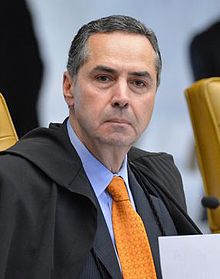Luís Roberto Barroso
Luís Roberto Barroso | |
|---|---|
 Justice Barroso during plenary session in 2014 | |
| Justice of the Supreme Federal Court | |
| Assumed office 26 June 2013 | |
| Appointed by | Dilma Rousseff |
| Preceded by | Ayres Britto |
| Personal details | |
| Born | 11 March 1958 Vassouras, Rio de Janeiro, Brazil |
| Alma mater | Rio de Janeiro State University (B.D.), (PhD) Yale University (LL.M.) |
show
Other judicial positions | |
Luís Roberto Barroso (born 11 March 1958) is a Brazilian law professor, jurist, Justice of the Supreme Federal Court of Brazil, having been nominated to the position by President Dilma Rousseff in 2013, and, since 25 May 2020, Barroso has also served as President of the Superior Electoral Court.[1]
Barroso graduated in law from the Universidade do Estado do Rio de Janeiro (UERJ), has a Master's Degree in law by Yale University, and a PhD from UERJ, being a Professor of Constitutional Law in the university, while also doing post-doctoral studies in the Harvard Law School.
He is considered a liberal and progressive Justice,[2][3] making landmark votes on the legalization of abortion in pregnancies originated from rape[4] and the criminalization of homophobia and transphobia in Brazil.[5]
Life and career[]
Born in the city of Vassouras, Barroso received a bachelor's degree in law from the State University of Rio de Janeiro (UERJ) in 1980, and an LL.M. from Yale Law School in 19 He received a doctorate in public law from UERJ in 2008 and is a tenured professor of constitutional law at the university.[6][7] In 2011, Barroso was a visiting scholar at Harvard Law School, and while in the United States published the paper "Here, there and everywhere: human dignity in contemporary law and in the transnational discourse".[8][9]
Barroso owned the law firm Luís Roberto Barroso & Associados in Rio de Janeiro, which specialized in public law and Supreme Court litigation.[9] Prior to being nominated to the Supreme Federal Court by Dilma Rousseff in May 2013 to replace Justice Carlos Ayres Britto, Barroso served as a state attorney in Rio de Janeiro state. He was the fourth Supreme Court nominee of Rousseff, who had previously nominated the justices Luiz Fux, Rosa Weber and Teori Zavascki.[10] He was confirmed by the Federal Senate in early June, and was sworn into office on 26 June 2013.[11]
Barroso has been invited to lecture in various universities around the world, including the prestigious New York University School of Law, in the United States, and London School of Economics and Oxford University, in England.[12][13]
Barroso is an advocate for drug legalization, starting with decriminalising the possession of marijuana for private consumption.[14] His judicial views have been described as progressive.[15]
References[]
- ^ Teixeira, Matheus; Fernandes, Talita (24 May 2020). "Barroso assume TSE em meio a ações que miram chapa Bolsonaro-Mourão" (in Portuguese). Folha de S. Paulo. Retrieved 25 May 2020.
- ^ "Um progressista no Supremo". Valor Econômico (in Portuguese). Retrieved 3 August 2021.
- ^ "10 opiniões que fazem de Barroso o liberal mais poderoso do Brasil". Instituto Mercado Popular. 10 September 2017. Retrieved 3 August 2021.
- ^ "Turma do STF decide que aborto nos três primeiros meses de gravidez não é crime". Agência Brasil (in Portuguese). 29 November 2016. Retrieved 3 August 2021.
- ^ "Julgamento da ADO 26 e do MI 4733 – omissão legislativa em criminalizar a homofobia e a transfobia – Luís Roberto Barroso" (in Portuguese). Retrieved 3 August 2021.
- ^ "Composição Atual :: STF – Supremo Tribunal Federal". STF. 1 July 2013. Retrieved 20 September 2015.
- ^ http://www.stf.jus.br/arquivo/cms/sobreStfComposicaoComposicaoPlenariaApresentacao/anexo/cv_ministro_luis_roberto_barroso_mai2013.pdf
- ^ https://lawdigitalcommons.bc.edu/cgi/viewcontent.cgi?referer=https://www.google.com/&httpsredir=1&article=1681&context=iclr
- ^ Jump up to: a b https://law.yale.edu/yls-today/news/prof-luis-roberto-barroso-89-llm-discuss-brazils-unbalanced-democracy
- ^ http://g1.globo.com/politica/noticia/2013/05/dilma-indica-constitucionalista-luis-roberto-barroso-para-o-stf.html
- ^ http://g1.globo.com/politica/noticia/2013/06/luis-roberto-barroso-toma-posse-como-ministro-do-supremo.html
- ^ "Brazil: Looking Beyond the Crisis".
- ^ "Brazil Forum UK".
- ^ "Brazil must legalise drugs, existing policy destroys lives".
- ^ https://www.valor.com.br/cultura/4156910/um-progressista-no-supremo
- 1958 births
- Living people
- Supreme Federal Court of Brazil justices
- Yale University alumni
- People from Rio de Janeiro (state)
- Rio de Janeiro State University alumni
- Brazilian Jews
- Brazilian people of Greek-Jewish descent
